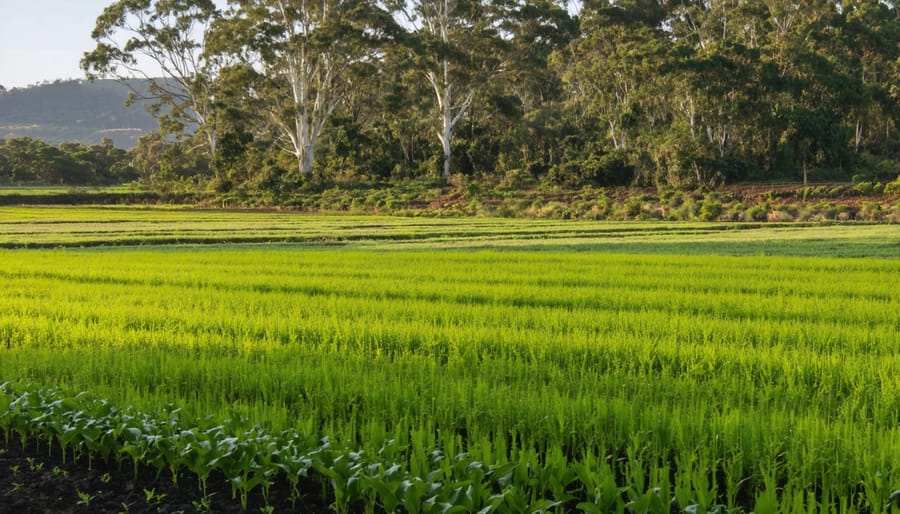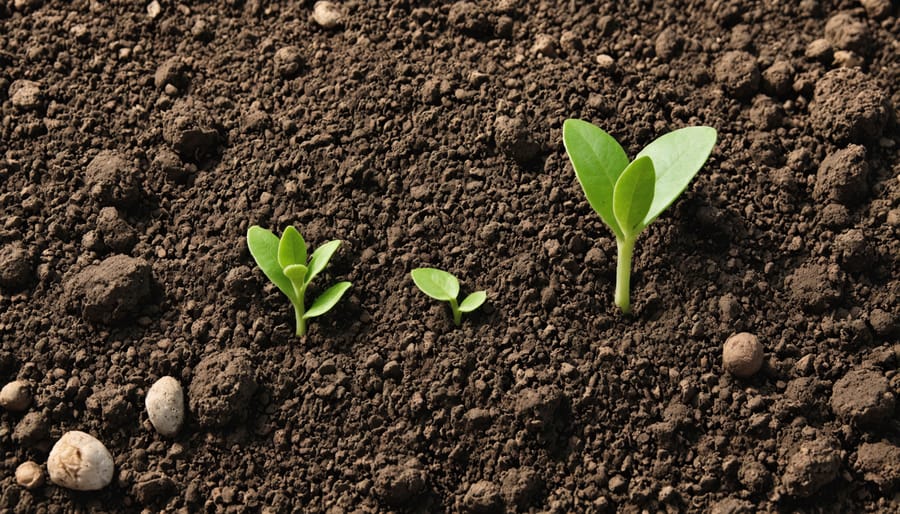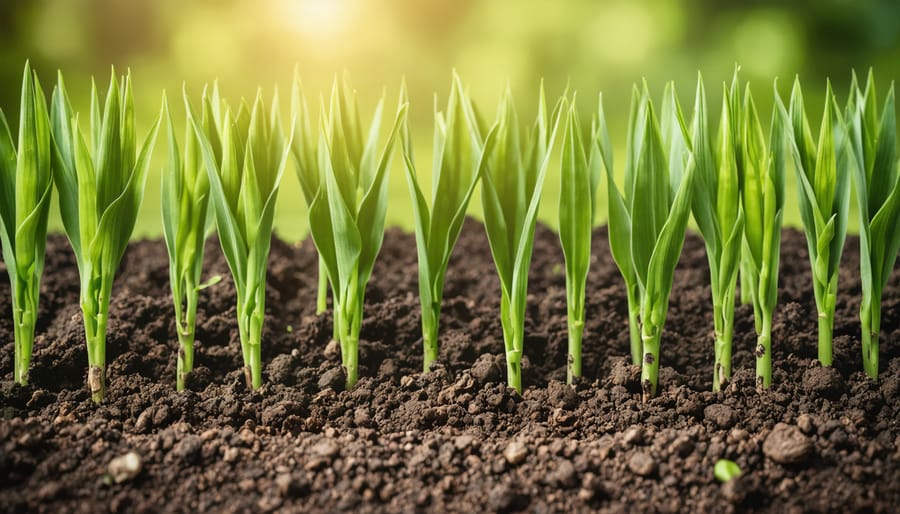Organic farming revolutionizes Australian agriculture by reconnecting communities with their food sources while regenerating our unique landscape. As climate challenges intensify, more farmers are embracing sustainable living practices through organic methods that work in harmony with our distinct ecosystems. From the rich soils of Tasmania to the challenging conditions of the outback, organic sustainable farming offers a proven pathway to nurture both land and community.
Beyond merely avoiding synthetic pesticides, this holistic approach builds resilient food systems through indigenous knowledge, innovative water conservation, and soil biology enhancement. Local success stories demonstrate how organic methods boost farm productivity while protecting native biodiversity – creating thriving agricultural communities that support both environmental and economic sustainability.
By embracing organic certification standards and implementing regenerative practices, Australian farmers are leading a transformation in how we grow food, strengthen regional economies, and protect our precious natural resources for future generations. This shift represents more than just a farming method – it’s a return to agricultural wisdom that honours our connection to Country while ensuring food security in an uncertain climate future.

The Australian Organic Advantage
Climate-Smart Solutions
Australia’s diverse climate zones, from tropical north to temperate south, require thoughtful adaptation of organic farming practices. In Queensland’s tropical regions, farmers are embracing permaculture designs that work with the intense rainfall patterns, using strategic water catchment systems and drought-resistant native species. These systems help maintain soil moisture during dry spells while preventing erosion during heavy rains.
In Victoria and Tasmania’s cooler climates, organic farmers are extending growing seasons through innovative greenhouse designs and natural frost protection methods. Many are incorporating indigenous knowledge of seasonal patterns, known as seasonal calendars, to better time their planting and harvesting cycles.
Central Australian farmers face unique challenges with arid conditions, leading to the development of water-wise organic techniques. These include deep mulching, companion planting with native species, and the use of shade cloth systems that mimic natural canopy protection. Successful organic farms in these regions often combine traditional Aboriginal land management practices with modern sustainable technologies.
Coastal regions benefit from maritime influences but require careful soil management to prevent salt damage. Here, farmers are creating windbreaks using native species and implementing innovative composting methods that build resilient soil structures.
Building Local Food Security
Organic sustainable farming plays a crucial role in strengthening local food security across Australian communities. By cultivating diverse crops suited to our unique climate zones, from the tropical north to the temperate south, organic farmers create resilient food systems that can withstand environmental challenges and market fluctuations.
Local food networks built around organic farms help shorten supply chains, ensuring fresher produce reaches consumers while reducing transport emissions. In regions like the Atherton Tablelands and Victoria’s Yarra Valley, organic farmers’ markets and community-supported agriculture programs have become vital hubs connecting growers directly with local residents.
These local food systems prove particularly valuable during times of supply chain disruption, as demonstrated during recent natural disasters and the pandemic. Many Australian communities have found that organic farms operating with sustainable practices can maintain consistent food production even when conventional supply chains falter.
Beyond food production, organic farming builds community resilience through knowledge sharing and skill development. Local farming workshops, seed-saving networks, and community gardens are creating new generations of food-literate Australians who understand the importance of sustainable local food systems.
Core Organic Farming Practices
Soil Health Management
In the heart of Australian organic farming, healthy soil is the foundation of a thriving farm ecosystem. Our unique soil conditions require thoughtful management techniques that work with nature rather than against it. The good news is that building robust, living soil doesn’t need expensive inputs or complicated methods.
Composting stands as a cornerstone of soil health management. Many successful organic farmers across Australia create their own compost using locally available materials like farm waste, fallen leaves, and kitchen scraps. The secret is maintaining the right balance of green materials (nitrogen-rich) and brown materials (carbon-rich) in your compost pile, typically aiming for a 3:1 ratio of browns to greens.
Cover cropping has proven particularly effective in our climate, with plants like woolly pod vetch and crimson clover working brilliantly to protect and enrich the soil. These plants not only prevent erosion during our intense summer storms but also fix nitrogen naturally into the soil.
Crop rotation is another essential practice that Australian organic farmers swear by. By rotating crops systematically, you’ll naturally break pest cycles and balance nutrient usage. A simple four-year rotation might include legumes, leafy greens, root vegetables, and fruit crops.
Natural mulching with materials like sugar cane mulch or lucerne hay helps retain moisture – crucial in our dry climate – while gradually breaking down to feed the soil food web. Remember, healthy soil means resilient crops and better yields, naturally.

Water-Wise Farming
In the sun-scorched landscape of Australia, water-wise farming isn’t just a choice – it’s essential for survival. Smart water management helps farmers protect water resources while maintaining productive organic farms.
Leading Australian organic farmers are embracing innovative irrigation techniques like drip systems, which deliver water directly to plant roots, reducing waste by up to 60% compared to traditional sprinkler systems. Mulching with locally sourced materials such as sugar cane waste or eucalyptus bark helps retain soil moisture and reduces evaporation.
Many farmers are now incorporating water-harvesting techniques, including contour farming and swales, which naturally direct rainfall where it’s needed most. Installing rainwater tanks and creating farm dams provides reliable water storage for drier periods, while choosing drought-resistant native species ensures crops can thrive with minimal irrigation.
Soil health plays a crucial role in water conservation. Building organic matter through composting and cover cropping increases the soil’s water-holding capacity, meaning less frequent watering is needed. Some innovative farmers are using soil moisture sensors and weather monitoring systems to optimise irrigation timing and volume.
Time-tested Indigenous water management practices, such as following natural water flows and understanding seasonal patterns, are being integrated with modern techniques, creating resilient farming systems that honour traditional knowledge while embracing contemporary solutions.
Natural Pest Management
Australia’s unique ecosystem offers natural solutions for pest management that work in harmony with our environment. Instead of reaching for chemical pesticides, successful organic farmers harness the power of beneficial insects native to our continent. Ladybirds, parasitic wasps, and praying mantises are nature’s pest controllers, effectively managing common crop threats while maintaining ecological balance.
Creating an environment that attracts these helpful insects is key. By incorporating native plant restoration into your farming design, you’ll provide natural habitat for beneficial insects while supporting local biodiversity. Native flowering plants like bottlebrush, grevillea, and tea tree are particularly effective at attracting these helpful creatures.
Companion planting is another powerful strategy in our organic pest management toolkit. Planting native herbs like lemon myrtle alongside vegetables can naturally deter unwanted insects, while marigolds and native daisies help protect your crops by attracting predatory insects that feed on common pests.
Physical barriers such as fine mesh nets and strategic garden design also play crucial roles. Many Australian farmers successfully use sacrificial barrier crops and trap crops to protect their main produce. Regular monitoring and early intervention using organic solutions like neem oil or homemade garlic sprays can prevent small pest issues from becoming major problems.
Remember, a healthy soil ecosystem is your best defence against pests. Strong plants grown in nutrient-rich soil naturally resist pest attacks, creating a resilient farming system that thrives without chemical interventions.
Community Integration

Farm-to-Table Networks
Farm-to-table networks are revolutionising how Australians connect with their food sources, creating vital links between organic farmers and local consumers. These direct relationships are flourishing across the country, from bustling farmers’ markets in Melbourne to community-supported agriculture (CSA) programs in regional New South Wales.
In recent years, innovative platforms have emerged to strengthen these connections. Digital marketplaces help small-scale organic farmers reach urban customers directly, while food co-ops and produce boxes deliver fresh, seasonal produce straight from local farms to suburban doorsteps. The Northern Rivers region of NSW, for instance, has developed a thriving network where over 40 organic farmers supply fresh produce to local restaurants, schools, and families.
These direct partnerships offer multiple benefits. Farmers receive fair prices for their produce and valuable feedback from their customers, while consumers enjoy ultra-fresh, seasonal food and the satisfaction of supporting local organic agriculture. Many Australian farmers are now hosting farm visits and harvest days, helping city dwellers understand where their food comes from and the importance of sustainable farming practices.
To get involved, Australians can join local food networks, subscribe to organic produce boxes, or participate in community gardens. These initiatives not only support sustainable farming but also build resilient local food systems that benefit both producers and consumers while reducing food miles and packaging waste.
Educational Opportunities
Connecting young minds with sustainable farming practices creates lasting impact in our communities. Across Australia, organic farms are increasingly opening their gates to school groups and community organisations, offering hands-on learning experiences that go beyond traditional classroom education.
Many successful organic farms have partnered with local primary schools to establish kitchen garden programs, where students learn about growing food, composting, and the importance of soil health. These programs not only teach valuable skills but also help children understand where their food comes from and why sustainable farming matters.
Community education initiatives, like farm open days and workshops, provide opportunities for people of all ages to learn about organic farming methods. These events often feature practical demonstrations of composting techniques, natural pest management, and water conservation strategies specific to Australian conditions.
Several organic farms have developed structured educational programs that align with the Australian curriculum, making it easier for schools to incorporate farm visits into their teaching plans. These programs often connect with broader environmental initiatives, supporting ecological restoration in communities and helping students understand the relationship between farming and ecosystem health.
For adults interested in sustainable farming, many organic farms offer apprenticeship programs and regular workshops, providing practical skills and knowledge for those looking to start their own organic farming journey or transition existing operations to more sustainable methods.
Getting Started
Certification Pathways
In Australia, achieving organic certification is a structured journey that validates your commitment to sustainable farming practices. The two main certification bodies, Australian Certified Organic (ACO) and NASAA Certified Organic (NCO), offer comprehensive pathways to official recognition.
The certification process typically begins with a three-year conversion period, during which farmers must demonstrate their adherence to organic principles. During this time, your land undergoes a transformation as synthetic chemicals and non-organic inputs are eliminated from your farming system.
Both ACO and NCO certification programs require detailed documentation of farming practices, regular soil testing, and annual audits. While this might seem daunting, these organisations provide support and guidance throughout the journey. Many successful organic farmers started small, certifying a portion of their land before expanding their organic operation.
For smaller producers, there’s also the option of group certification schemes, which can help reduce costs and administrative burden. These schemes are particularly popular among community farming initiatives and small-scale producers who work cooperatively.
The investment in certification opens doors to premium markets and builds trust with consumers. Many Australian organic farmers report that certification not only validates their practices but also connects them to a supportive network of like-minded producers. Local organic farming associations often run mentorship programs, linking experienced certified farmers with those starting their certification journey.
Support Networks
Australia’s organic farming community thrives through interconnected support networks that make sustainable agriculture more accessible and successful. From regional farming groups to national organisations, these networks provide invaluable resources and knowledge-sharing opportunities.
State-based organic farming associations, such as NSW Organic Food, NASAA Organic, and Australian Organic, offer membership benefits including certification guidance, technical support, and regular workshops. These organisations frequently host field days where farmers can learn from experienced practitioners and see successful organic operations firsthand.
Local farming cooperatives play a crucial role in building resilient communities. These groups often share equipment, bulk-buy supplies, and coordinate produce distribution, making organic farming more economically viable for small-scale producers. Many regions have established mentor programs, pairing experienced organic farmers with those transitioning to sustainable practices.
Digital platforms have revolutionised how organic farmers connect and learn. Online forums and social media groups specific to Australian organic farming provide spaces for immediate problem-solving and experience sharing. Popular platforms include the Australian Organic Farmers Discussion Group and various state-based WhatsApp communities.
For newcomers to organic farming, agricultural extension services and TAFE courses offer structured learning pathways. These programs often combine theoretical knowledge with practical experience, helping farmers develop the skills needed for successful organic cultivation. Regular farmers’ markets and organic farming conferences also provide valuable networking opportunities and chances to connect with like-minded individuals in the sustainable agriculture community.
Organic sustainable farming represents more than just a method of agriculture – it’s a pathway to a resilient and sustainable future for Australian communities. By embracing natural farming practices, supporting local ecosystems, and building strong community networks, we can create lasting positive change in our food systems. The success stories from farms across the country demonstrate that organic farming is not only environmentally sound but also economically viable. Whether you’re a seasoned farmer, a small landholder, or simply interested in supporting sustainable agriculture, there’s a place for you in this growing movement. Take the first step today by connecting with local organic farming groups, attending workshops, or starting your own organic garden. Together, we can cultivate a healthier, more sustainable Australia for generations to come. The transition to organic farming might seem challenging, but remember: every sustainable practice adopted is a step towards positive change.
